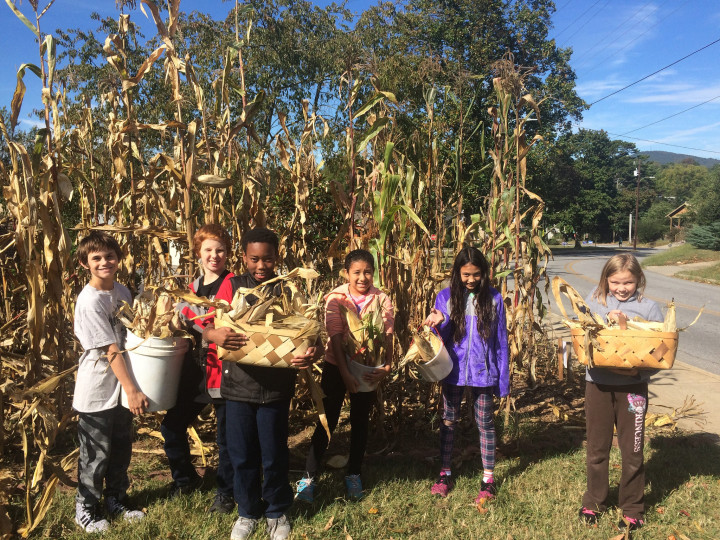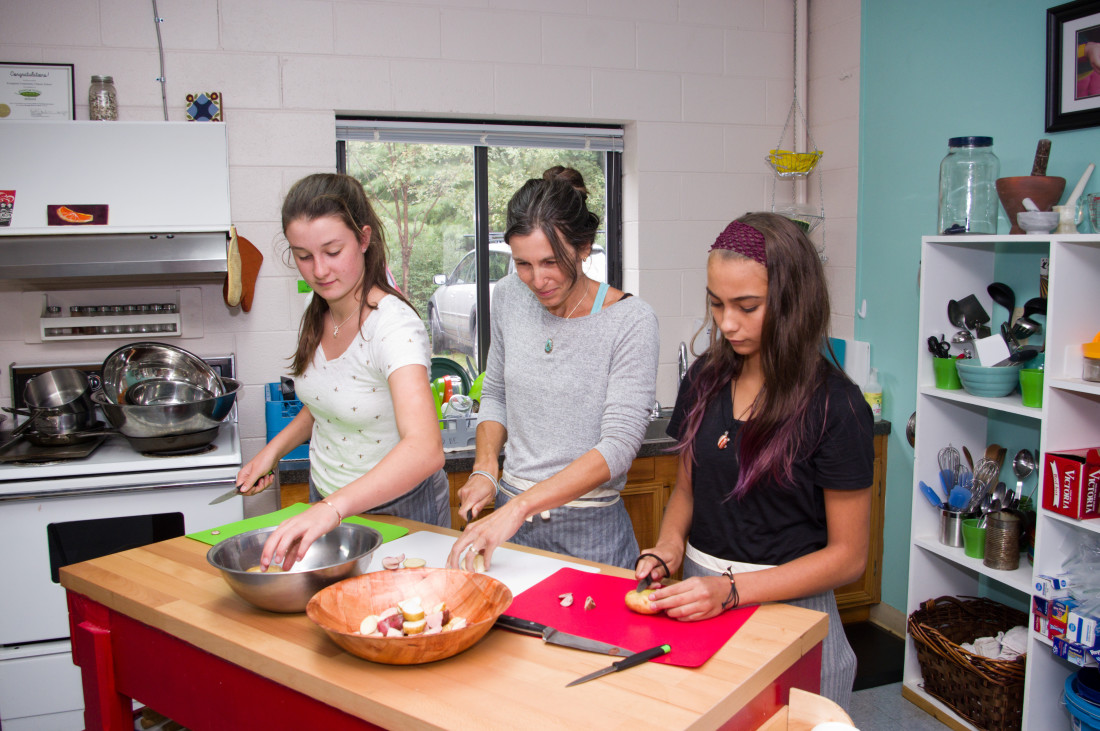Edible education, which seeks to make nutrition, cooking and gardening fundamentals accessible to students, is a budding element within schools nationwide. But food-related studies generally fall outside the normal curriculum, often forcing these programs to rely on donations, grants, volunteers and the vagaries of fundraising efforts.
For this reason, most schools in the Asheville area aren’t able to take learning into the kitchen or garden unless classes are facilitated by outside organizations or launched by teaching staff.
According to Janette Broda, the school nutrition director for Asheville City Schools, every school district is required to at least offer a nutrition program. And in schools where cooking or gardening education isn’t an option, school cafeterias will offer events like “Try-it Tuesdays,” where students can sample foods that may be new to them, such as radishes, sweet potato sticks, smoothies or traditional Cherokee foods.

Asheville Primary School and Preschool in West Asheville takes a predominantly garden-centered approach to edible education. Each classroom plants and cares for its own garden bed, and teachers then incorporate the harvest into their lesson plans through activities like taste-testing.
Polly Bolding, the school’s enrollment and engagement coordinator, says that students can use the knowledge and experience they glean from such instruction to critically approach their own and society’s relationships with and attitudes toward food — in both culinary and agricultural forms. Bolding has spent several years deepening and expanding the school’s gardening program.
Last year, Bolding’s students grew a bountiful diversity of crops, including pumpkins, watermelons, tomatoes, basil, cucumbers, greens and squash, along with a pollinator garden filled with flowers. “Our preschool classrooms loved harvesting the carrots, cucumbers and tomatoes and washing them and eating them for a snack,” says Bolding. “I’ve definitely seen children taking an interest in the natural world as a whole. It really creates an enthusiasm for healthy foods and an understanding of where food comes from.”
At Evergreen Community Charter School, an expeditionary learning school in East Asheville, environmental education coordinator Marin Leroy works to bring this same enthusiasm and connection to the natural world to her students through her cooking and gardening program, Field to Feast. Leroy, who serves on the board of directors of local food education nonprofit FEAST, says she established the program in an effort to incorporate culinary concepts into all aspects of the curriculum. “So when our third-graders are studying about body systems, I’m teaching them about specific foods that can support and nurture the body systems that they are learning about,” she explains.
Extracurricular
But figuring out how to implement cooking and gardening courses can be extremely challenging for schools. Both APS and Evergreen’s programs are grant-supported. “There’s no funding within the school budget for school gardening or cooking,” says Bolding. “So it’s up to each school to figure out how to fund that — typically through their parents or through grants.”
At Evergreen, where the Field to Feast classes are taught as enrichments — similar to art or physical education — Leroy cobbled together a learning kitchen in a science classroom. She enlisted parents to donate whatever cooking equipment they could, and she taps them as volunteers to help with maintaining the gardens and supervising the cooking classes.
“In recent decades it seems that garden and kitchen classes have been categorized as extracurricular experiences, taught after school or in summer camp or not at all in the public schools,” she says. “These classes are rich with academic content as well as opportunities to learn important life skills, express creativity and build self-confidence. But finding funding to support these classes and programs is a challenge.”
Schools that want vibrant edible education programs, she continues, must seek grassroots funding and support from partner organizations and from local foundations and grants. “Schools that have edible education programs have administrators and teachers who are passionate. They are including food and garden education in their schools because they see the positive effects on their students and families, but at this time there is not formal state or district funding for these programs.”
Several local businesses and organizations have stepped up to partner with Asheville-area schools in this capacity. Mother Earth Produce supplies Leroy and FEAST with all of the fresh vegetables and fruits used in their cooking classes. And Sow True Seed, which gives away 50 free seed packets annually to any school that’s cultivating a garden, is primarily responsible for what’s growing at Bolding’s school. “Usually, we plant all 50 packets,” says Bolding.
And both APS and Evergreen partner with FEAST, which works in schools with the mission of getting all kids to eat fruits and vegetables every day through easy, hands-on gardening and kitchen education projects. FEAST, which stands for Fresh, Easy, Affordable, Sustainable and Tasty, is the only formal cooking education resource that APS has access to.
This is the case for other Asheville schools as well, including Vance Elementary School and Francine Delaney New School for Children. “We work in schools … that have high percentage[s] of kids on free and reduced lunch, so [we’re] working with kids who wouldn’t otherwise have the opportunity to have this kind of edible education,” says FEAST co-founder Cathy Cleary.
Cleary goes on to explain that it costs about $100 per student per year for FEAST programming. “To start a new program is a big deal,” she says. “If there are 500 students that we need to serve at a school, we need $50,000.”
But she notes that if a school can come up with part of that money, fundraising and in-kind donations can round out the amount needed to kick-start a program. This is where community partnerships are key. “The easier part is finding donations for plants and seeds and materials and donated labor for specific projects,” says Bolding. “What’s tricky is finding a way to fund any people to coordinate the garden or maintain the garden or to do the actual garden education or nutrition classes with the kids.”
In the kitchen
While many Asheville primary and elementary school programs focus on gardening and nutrition, Asheville High School shifts the spotlight to food preparation with an intensive, two-year culinary program.
The course starts with an introductory-level culinary class, which program director Brian Stout says is similar to a ServSafe sanitation program. Next, students can then take Culinary 1, which introduces basic concepts like making salads, stocks and soups, hot cooking techniques and baking. The program wraps up with Culinary 2, a yearlong class that allows students to create dishes and focus on areas of interest.
Asheville High’s culinary education program is classified as Career Technical Education, or CTE, so unlike edible education efforts at many other schools, it receives federal funding. But community partnerships are key to Stout’s program, too. Ingles provides 100 percent of the ingredients used in the cooking classes, and Stout works closely with the A-B Tech culinary program. Stout also says he tries to keep tabs on area restaurants that may have jobs available for working-age students.
Students who complete the program, he says, possess not only basic culinary knowledge but have also cultivated discipline and a work ethic. “You see them come in the intro course and they have that lost look in their eyes like, ’Oh my goodness, what’s going on?’” he says with a chuckle. “And then you see them start to grow through Intro, and then in level one they really start to build on the skills that we’ve talked about through the intro course. And then by the time they make it through level two for that full year, they’re mainly working independently. So you just see a lot of growth from the time they walk in to the time they end with the program, which is, you know, kind of rewarding. More than most things.”



Before you comment
The comments section is here to provide a platform for civil dialogue on the issues we face together as a local community. Xpress is committed to offering this platform for all voices, but when the tone of the discussion gets nasty or strays off topic, we believe many people choose not to participate. Xpress editors are determined to moderate comments to ensure a constructive interchange is maintained. All comments judged not to be in keeping with the spirit of civil discourse will be removed and repeat violators will be banned. See here for our terms of service. Thank you for being part of this effort to promote respectful discussion.